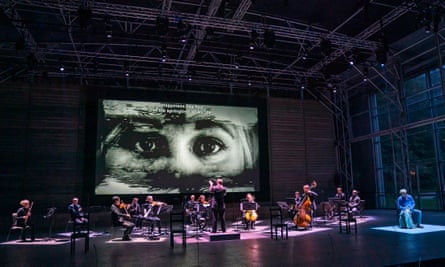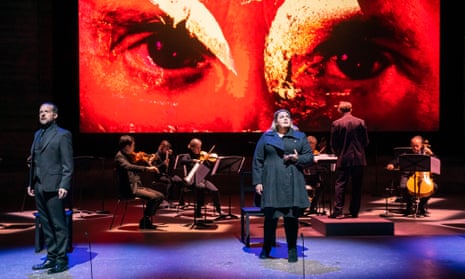‘Oh God, what a moment!” Leonore sings in the final scene of Fidelio as she releases Florestan from his chains. Beethoven’s great plea for justice and liberty also examines the role and nature of hope in the face of individual and collective crisis, which throughout its history has always given the opera profound significance in dark times. As we emerge after lockdown into a world rendered uncertain by Covid-19, few works speak to us so directly, and Garsington Opera’s decision to return to live music with it, in a staging by Peter Mumford, conducted by Douglas Boyd, consequently has tremendous symbolic resonance.
Adhering to physical distancing guidelines, Mumford reworks a simple, straightforward concert staging that was first seen at the Paris Philharmonie in 2016. Black-and-white prison images, reminiscent of Piranesi or Goya, stream across a video screen at the back of the stage, turning blood red whenever Andrew Foster-Williams’s Pizarro threatens violence or murder. The dialogue is omitted and replaced with narrative titles, a bit like those from a silent film, while pools of light ambivalently suggest at once cramped, enclosed spaces and keep the performers at a safe distance from one another. The Prisoners’ Chorus, recorded virtually during lockdown and seen in split-screen, is startling and exceptionally powerful.

Musically it’s often wonderful, though Toby Spence, as Florestan, took a while to get into his stride on opening night, sounding a bit effortful in Gott! Welch’ Dunkel hier! Singing her first Leonore, Katherine Broderick is by turns deeply affecting and thrilling: Töt’ erst sein Weib is simply electrifying. Foster-Williams’s Pizarro is splendidly menacing, Stephen Richardson makes a troubled, sympathetic Rocco, and Galina Averina and Trystan Llŷr Griffiths are sweet and really touching as Marzelline and Jaquino. Boyd, meanwhile, uses a reduced orchestration for 13 instrumentalists from the Philharmonia, conducting with passion, style and a wonderful sense of dramatic momentum. The whole thing is haunting, beautiful and extraordinarily moving.

Comments (…)
Sign in or create your Guardian account to join the discussion